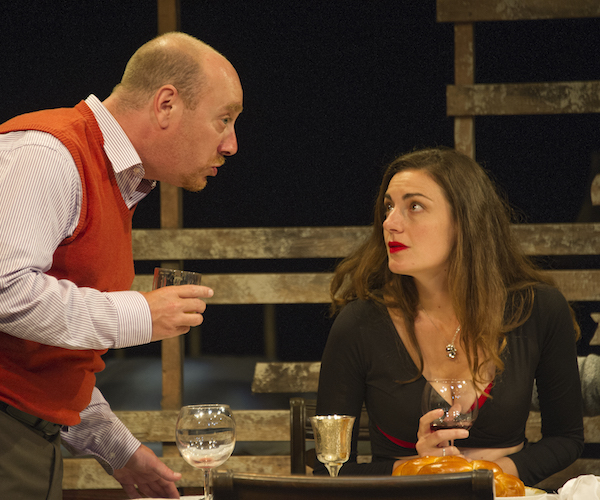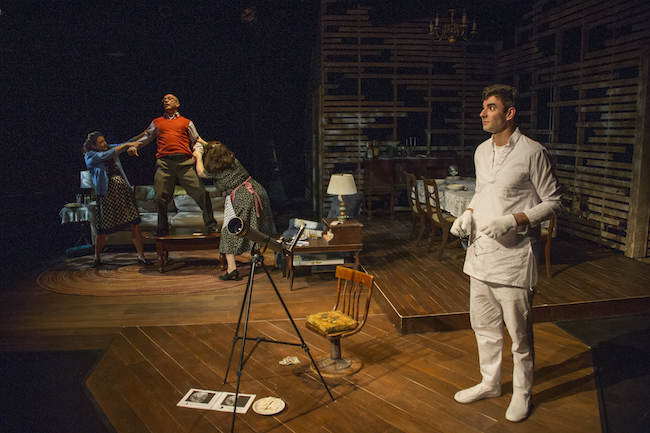Theater Review: “The Last Schwartz” — Family Matters
Yes, The Last Schwartz is a family drama through and through, but it is well crafted and touching.
The Last Schwartz by Deborah Zoe Laufer. Directed by Paula Plum. Presented by the Gloucester Stage Company at the Gorton Theatre through July 30.

Gabriel Kuttner and Andrea Goldman in the Gloucester Stage production of “The Last Schwartz.” Photo: Kippy Goldfarb/Carolle Photography.
By Jess Viator
Every family has its own mythos: a rose-tinted chronicle of the past, memories chockablock with good times and humor, yarns populated by overly simplified glimpses into personalities whose edges have been smoothed and polished by repeated tellings. This mental buffing becomes even more powerful when the subjects in question have passed on. How do family high jinks to evolve into legend? And do these legends mean anything if there is no younger generation to pass them down to?
The Last Schwartz begins as a routine family gathering for the Schwartzes. Four adult siblings, Norma, Herb, Gene, and Simon, have convened along with Herb’s wife Bonnie, and Gene’s girlfriend-of-the-moment, Kia, to observe their late father’s Yahrzeit—the first anniversary of his death. Norma has taken on the mantle of head of the family, forcing her preferred version of the family’s past onto her thoroughly apathetic brothers. Many of these traditions are rooted in Judaism, and all of them center around their parents’ house. Herb seems comfortable and content with his life with Bonnie and is uninterested in practicing religion or reliving the past. Gene is a successful television director wholly wrapped up in the glitz and glamor of his bi-coastal life. Simon is a brilliant and neuroatypical astronomer who resides in Australia. He happily lives within his own thoughts.
Each character is introduced via a vibrant dramatic revelation. Bonnie monologues frenetically about a bit she saw on television; desperate to be heard, she all but begs the Schwartzes to pay attention to her (they don’t). Herb and Norma bicker relentlessly about the coffee table. He wants to put his feet up on it while he reads the newspaper; she insists on observing pointless domestic decorum in their late parents’ house. Simon is silent, motionless, and set apart by his stark, white clothing. He is generally ignored as he sits on the porch, squinting through the eyepiece of a telescope. Gene’s late arrival triggers a strained argument with Norma, who objects to his surprise guest — Gene’s extremely attractive but artless girlfriend, Kia.
Deborah Zoe Laufer’s script doesn’t have a complicated plot. Six characters, trapped in a house together, undergo various tragicomic interactions. And, at first, the play is content to serve up bold and recognizable characterizations. But The Last Schwartz turns out to be a clever character study because it moves beyond the formulaic. The audience is initially drawn in by the overblown and familial archetypes, but that comfort is challenged because the characters are methodically broken down, their realistic feelings and motivations probed. These brash characters are slowly fleshed out, becoming complex and sympathetic people.
Each of these characters have a distinct emotional arc which puts their best and worst traits on full display. Kia’s uninhibited nature and anything goes attitude throws some much needed confrontational lighter fluid onto the family’s long smoldering coals. The safe, lazy weekend of everyone going through the motions is transformed into a revelatory event. The script seamlessly weaves each character in and out of the main action and, by the end, you get a sense that Laufer has conjured up a rich tapestry of family history, the current personal struggles pushed into the foreground.
Jon Savage’s thoughtful set design contributes to the play’s theme: each life is part of a larger whole. The main playing area is a living room full of well-loved furniture preserved in situ since the ’50s. There is a dining room just behind it, on a raised platform, with a classic dining room table complete with a lace tablecloth and the good china. The walls of these two rooms are comprised of sparsely distributed wooden slats strategically placed to reveal, when the lighting is right, glimpses of bedrooms behind.
The characters are rarely off of the main stage; even when they are sleeping they remain a vital part of the drama. Off to the side, but close to the audience, there’s the suggestion of a porch with a chair and a telescope (the addition of a plate of matzo and a juice box is a charming touch). Simon spends most of his time during the weekend here, contemplating the moon. And there is a moon: a glorious, enormous, realistic satellite shining down on the Schwartzes’ ancestral house. There is no separation between the three main rooms (the symbolic suggestion is that the family members are much closer together than they think). Ironically, Simon is as far away, but as omnipresent, as the moon.

Brianne Beatrice, Gabriel Kuttner, Veronica Wiseman, and Paul Melendy in the Gloucester Stage production of “The Last Schwartz.” Photo: Kippy Goldfarb/Carolle Photography.”The Last Schwartz.”
Simon is a challenging character to portray realistically and respectfully. Paul Melendy gives a triumphant performance. Simon very likely has autism, though his parents refused to have him diagnosed. He is a genius, and can remember and play back the image of any long-past night’s sky in his mind. He can’t tolerate the sensation of touch, so every part of him is covered, including his hands. He is disengaged from his family’s doings, unless they cajole him into a conversation — even then, he will answer questions rigidly and immediately drift back to his telescope. He has a life of his own in Australia, including a prestigious career, yet his family more or less treats him like a child. The script allows the audience occasional access to Simon’s inner world. He breaks the fourth wall, talking to us directly while the rest of the family is frozen still. In these moments he is what he can’t be in the real world: relaxed and engaged. He tells us about the moon. In a beautifully directed sequence, he imagines himself touring the orb. He puts on an imaginary helmet and low-gravity float-walks around the dinner table. Melendy gets at both aspects of Simon — his ‘free’ inner self and his inhibited social side. His real-world Simon is astoundingly well researched and convincing. The actor admirably captures the physicality of someone who is uncomfortable in the space he inhabits, who simply does not desire to belong.
Here, Paula Plum’s skill as a director is apparent: she finds every opportunity to highlight just how far Simon is outside of the family’s reality. He stands apart, always rotating away; even at the graveside he stands with his back to his father’s grave. The rest of the family tends to use him as a convenient sounding board — he is listening, but has no real interest — they are content to talk at him, confessing their biggest secrets and deepest fears.
All of the performances of the cast members in The Last Schwartz are superb. Each of the actors brings considerable energy to portraits of detailed verisimilitude. In particular, Brianne Beatrice as Bonnie grapples with some difficult material — Bonnie, the neurotic housewife, is the character most in danger of becoming a cartoon. Instead, she turns out to be the character who takes the most complex emotional journey, and Beatrice brings the audience along on that journey with admirable finesse.
Both Andrew Duncan Will’s sound design and Russ Swift’s light design are elegantly crafted, complementing each other as they evoke the woodsy solitude of the Catskills or the eerie bleakness of the moon, showing us that both the darkness of space and the intimacy of breathing can supply surprising amounts of comfort.
The Last Schwartz is a family drama through and through, but it is well crafted and touching. It ultimately asks us what it means to be a family when the parents are gone, and what happens when children realize that their lives are not in tune with the culture or the values or the house that meant so much to them. Does the family continue to be a family? Or, when there is a rupture with the past, is it necessary to redefine what a family is? The Last Schwartz does not answer these archetypal questions, but asks them in ways that compels us to ponder them as we relate them to our own lives.
Jess Viator is an emerging independent theater director, an occasional stage manager, and a lapsed playwright. She has a BA in theater performance, and recently completed a master’s degree in theatre studies from the University of Dundee in Scotland.
Tagged: Deborah Zoe Laufer, Gloucester Stage Company, Jess Viator, Paula Plum
